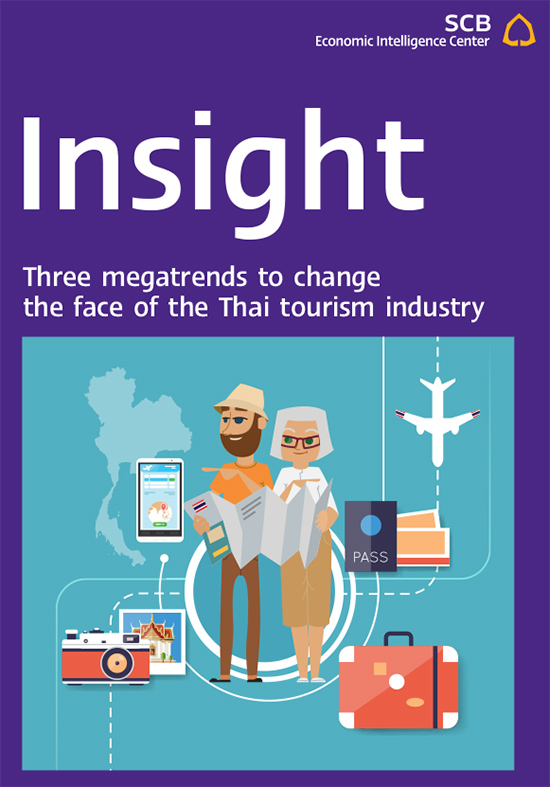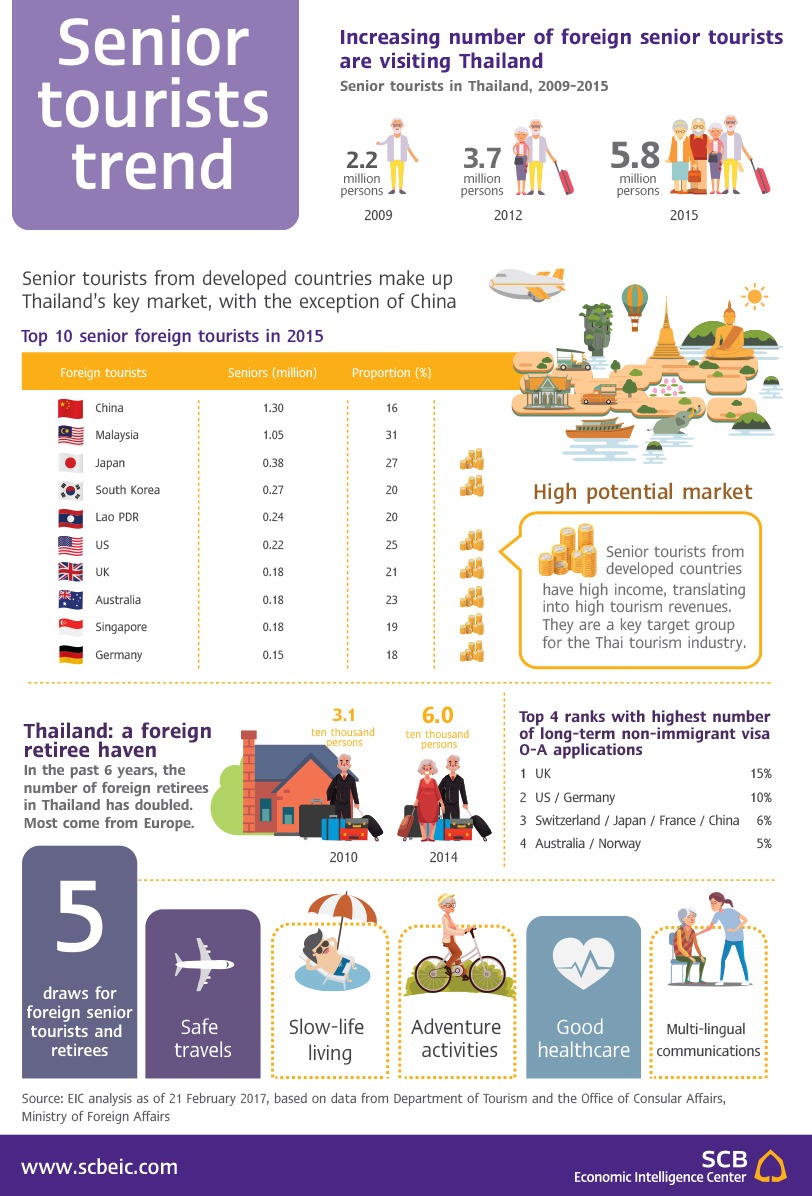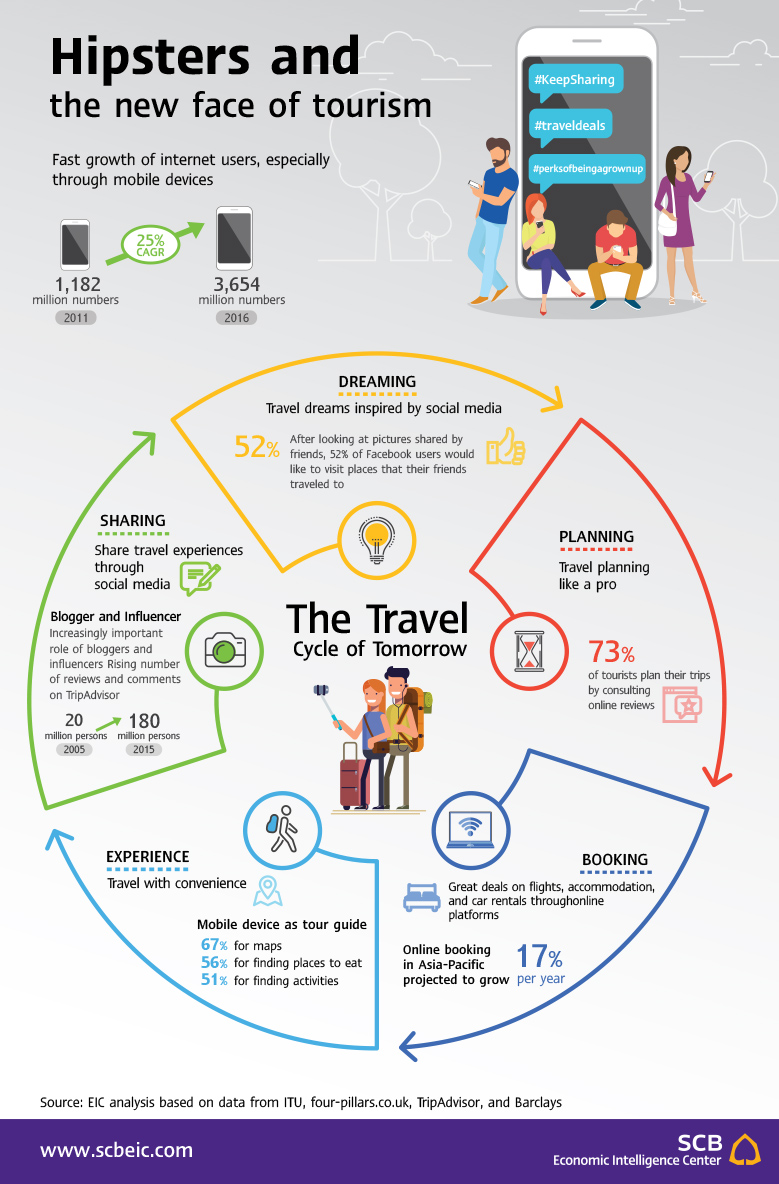Three megatrends to change the face of the Thai tourism industry
Megatrends are creating global waves of change that will force businesses in the tourism industry to adjust. The three major global trends are; 1) demographic change, especially rising numbers of senior citizens, who will account for an ever larger share of international trips and travel spending, 2) intensified international competition for arrivals and tourists’ spending as governments ease visas and promote tourism-related investments, and 3) the rising dominance of smartphones and social media in everyday life and consumer behavior, forcing businesses to adapt.
Contents
- Executive Summary
- Chapter 1: Megatrends reshape tourism industry
- Chapter 2: Thai tourism industry faces new challenges and opportunities
- Epilogue: Three keys to surviving change and thriving
Megatrends are creating global waves of change that will force businesses in the tourism industry to adjust. The three major global trends are; 1) demographic change, especially rising numbers of senior citizens, who will account for an ever larger share of international trips and travel spending, 2) intensified international competition for arrivals and tourists’ spending as governments ease visas and promote tourism-related investments, and 3) the rising dominance of smartphones and social media in everyday life and consumer behavior, forcing businesses to adapt.
Tourism businesses should prioritize the senior citizen segment, which is growing fast. Older tourists have greater spending power and more free time, yet their demands vary widely. The groups with the highest potential are senior leisure travellers, which have the highest trip spending per person of any age group, and foreign retirees. The increase in travel to Thailand by senior tourists has lifted the number of foreign retirees here. Thailand can expand its market among foreign retirees by targeting rich countries with large numbers of senior citizens, such as the United Kingdom, United States, Japan and Germany.
As more and more nations vie to attract tourists and travel spending, creating a more competitive marketplace, tourism businesses should explore new niches. Throughout the Asia-Pacific region and Middle East, governments are promoting the development of new tourist attractions. Because tourists will have more and more destinations to choose from, Thai tourism business owners will encounter greater competition. Rather than promoting well-known destinations, businesses should focus on expanding new tourism market niches, such as activity-based travel and adventure tourism, which rely on value-added services and unique experiences rooted in local cultural and natural heritage.
Today’s explosion in online information and services has helped drive fast growth of free and independent travel (FIT) while also increasing tourists’ sensitivity to prices. As a result, online marketing is ever more important, and competition from new entrants is rising. New global businesses like online travel agencies enable easier comparisons but make consumers more sensitive to price. Smartphones and social media have driven the rise of marketing via bloggers and ‘influencers,’ who share their personal experiences of travel. New business models are disrupting old ones; Airbnb allows individuals to rent out their private residences to tourists. In many countries, Airbnb has had a significant impact on hotels, especially those in the mid- and low-price ranges. It is likely to pressure Thai hotels going forward. Already, over a million Chinese tourists have used Airbnb, whose number of accommodations in Bangkok has more than doubled in the past year or so.
EIC recommends three strategies for Thai tourism businesses to cope with change and increase competitiveness. The strategies are 1) differentiate to attract quality tourists, such as by promoting new market segments that face less competition and rely on the uniqueness of local places and culture, 2) partner with related businesses in order to add value, such as by taking advantage of Thailand’s strengths in medical tourism to create packages for older travelers and foreign retirees, and 3) use technology and online media to reduce costs and expand customer reach. These megatrends presents both opportunities and challenges. Thai businesses should get proactive as soon as possible.


